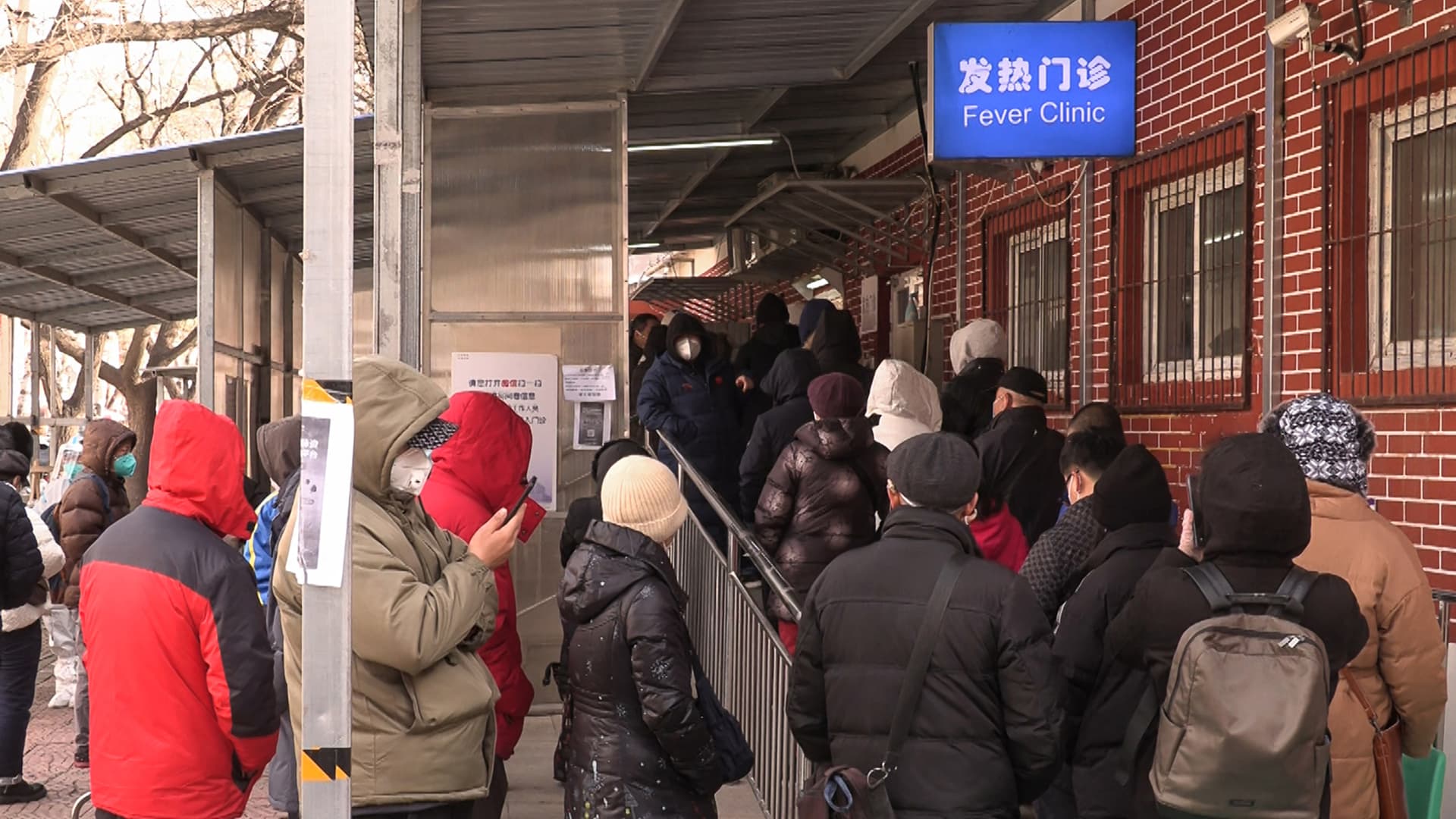People line up outside a fever clinic in Beijing on Dec. 14, 2022, just days after the country relaxed its Covid controls amid below-freezing weather in the capital city.
Yuxuan Zhang | Afp | Getty Images
BEIJING — Mainland China’s swift rollback of many Covid-related restrictions has been unexpectedly sudden, revealing a new set of economic challenges.
In the last two weeks, local and central government authorities relaxed several measures that had forced many people to stay home and businesses to operate mostly remotely. Notably, the central government said last week negative virus tests and health code checks were no longer needed to travel domestically.
Meanwhile, reports of locals falling ill have surged. Beijing city said that on Sunday, its fever clinics saw 22,000 visits — up 16 times from a week ago.
“This reopening has come rather suddenly, and rather resolutely. It’s exceeded our expectations,” said Gang Yu, co-founder and executive chairman of 111, an online seller of medicines and health-care services. That’s according to a CNBC translation of his comments in Mandarin.
Shortage of staff and medicines
Since late November, orders for fever-reducing products and related medicines have surged tenfold, Yu said in a phone interview Thursday. He said there’s an “extraordinary shortage” of medicines that factories can’t keep up with, a situation he expects will last for at least another three or four weeks.
On top of the high demand, tens of workers at 111’s warehouses or offices in different parts of China have tested positive for Covid, creating an “extraordinary shortage” of staff, Yu said.
That’s a different challenge from earlier this year, when widespread Covid lockdowns meant thousands of new orders were getting stranded at different distribution points each day, Yu said.
Delivery is still slower than normal in parts of the country.
Even as of Sunday, China’s postal agency said more than 400 distribution points in Beijing and other parts of the country remained closed for Covid-related reasons.
For a sense of scale, the postal service said Tuesday it was collecting more than 360 million parcels a day — that’s more than one package per person in the U.S.
We reckon that the incoming migration around the Chinese New Year holiday in late January could bring about an unprecedented spread of Covid and severe disruptions to the economy.
JD.com announced Wednesday that more than 1,000 couriers from other parts of the country had arrived in the capital city of Beijing. Anecdotally, in the last few days in Beijing, app-based food and grocery services that typically deliver within an hour were only doing so at far longer intervals, or a next-day basis.
Surging infections may offset easing
“Over the past two weeks, the Chinese government did a sudden 180-degree turn on ending its zero Covid policies, with most of the domestic prevention measures completely ditched,“ Nomura’s Chief China Economist Ting Lu and a team said in a report Thursday.
“Surging Covid infections may offset the positive impact of the easing in the near term.”
“The rapid surge of infections in big cities might be only the beginning of a massive wave of Covid infections,” the analysts said.
“We expect major activity indices to remain weak or even to drop further in December. We reckon that the incoming migration around the Chinese New Year holiday in late January could bring about an unprecedented spread of Covid and severe disruptions to the economy.”
China reported Thursday a worse-than-expected drop in retail sales in November, as well as slower growth in industrial production and fixed asset investment.
Get through winter first
Social activity remains subdued amid the surge of infections and below-freezing weather in northern cities. Traffic data from Baidu indicate that most people in large cities such as Beijing and Guangzhou have not ventured out, with congestion levels still very low as of Thursday.
Management at Chinese travel booking site Trip.com were also reserved in how soon domestic travel would rebound.
“We actually saw a very strong sequential increase in domestic flights and hotel reservations in the past two weeks,” they said Thursday, according to a FactSet earnings call transcript.
“But in the very near term, we are still cautious as winter is usually a flat season for both business and leisure travel,” they said.
“And it also might take some time for people to get through the first wave of infections before travel demand could fully release and rebound. But we anticipate to see a very nice rebound and growth in the domestic travel segment next year.”

